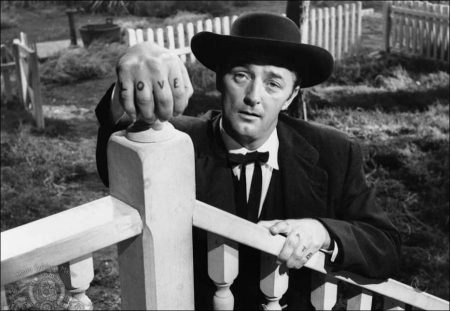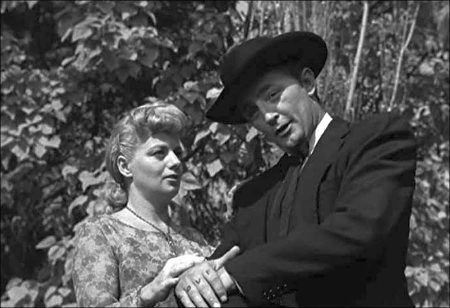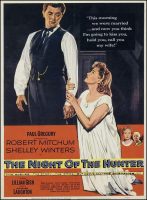The Night of the Hunter movie storyline. In West Virginia in the Great Depression, Reverend Harry Powell is a misogynistic serial killer and self-proclaimed preacher traveling along the Ohio River, who justifies murdering widows he marries for their money as doing God’s work. After reaching a small town sometime after his latest murder, Powell ends up being arrested for driving a stolen car and serves 30 days at Moundsville Penitentiary.
There he shares a cell with Ben Harper, an impoverished father of two who killed two men in a bank robbery for $10,000[a] he stole so that his children wouldn’t go hungry. With the police about to catch him, Harper made his children, John and Pearl, promise to never reveal where he hid the money. Despite Powell’s attempts to worm it out of him, Harper takes the secret to his grave.
Following his release, Powell makes his way to Harper’s tiny hometown, where he charms the townsfolk and woos Harper’s widow, Willa, a waitress for Walter Spoon and his wife Icey. Overnight Powell manages to win the town’s trust and weds Willa; only John remains instinctively distrustful. Powell suspects that John knows where the money is hidden and in a cornering John accidentally reveals that he indeed does.

Later as Powell begins to question Pearl, John reminds her of the promise whereby he inadvertently gives away that Pearl knows the secret too. Willa becomes deluded that Powell married her to redeem her soul, and begins preaching alongside him in tent revivals. However, she later overhears Powell threatening Pearl to reveal the money’s whereabouts whereupon she’s disabused of her faith in Powell.
Powell murders Willa the same night, dumping her body in the river while spreading the tale that she left her family for a life of sin. Powell proceeds to threaten the children before learning the money is hidden inside Pearl’s doll. While fishing, Birdie Steptoe, an elderly friend of the family, discovers Willa’s body, but refrains from telling the police in fear that he will be accused of the murder.
The children escape an enraged Powell and attempt to seek refuge with Birdie, who has drunk himself into a stupor. They use their father’s small johnboat to flee down the river, and eventually find sanctuary with Rachel Cooper, a tough old woman who looks after stray children.
The Night of the Hunter is a 1955 American film noir thriller directed by Charles Laughton and starring Robert Mitchum, Shelley Winters and Lillian Gish. The screenplay by James Agee was based on the 1953 novel of the same title by Davis Grubb. The plot focuses on a corrupt faux minister serial killer who charms an unsuspecting widow in order to get his hands on $10,000 in stolen bank loot hidden by her executed husband.
The novel and film draw on the true story of Harry Powers, who was hanged in 1932 for the murder of two widows and three children in Clarksburg, West Virginia. The film’s lyrical and expressionistic style, borrowing techniques from silent film, sets it apart from other Hollywood films of the 1940s and 1950s, and it has influenced such later directors such as Rainer Werner Fassbinder, Robert Altman, and Martin Scorsese.
Despite receiving negative reviews upon its original release, it has been positively re-evaluated in later decades and is now considered one of the greatest films ever made. It was selected for preservation in the United States National Film Registry in 1992. The influential French film magazine Cahiers du Cinéma selected The Night of the Hunter in 2008 as the second-best film of all time, behind Citizen Kane. In spite of the film’s later acclaim, the negative reaction to its premiere made it Charles Laughton’s only feature film as director.
The Night of the Hunter (1955)
Directed by: Charles Laughton
Starring: Robert Mitchum, Shelley Winters, Lillian Gish, Billy Chapin, Sally Jane Bruce, James Gleason, Evelyn Varden, Don Beddoe, Peter Graves, Gloria Castillo, Paul Bryar
Screenplay by: James Agee
Cinematography by: Stanley Cortez
Film Editing by: Robert Golden
Set Decoration by: Alfred E. Spencer
Art Direction by: Hilyard M. Brown
Music by: Walter Schumann
MPAA Rating: None.
Distributed by: United Artists
Release Date: July 26, 1955
Views: 116

